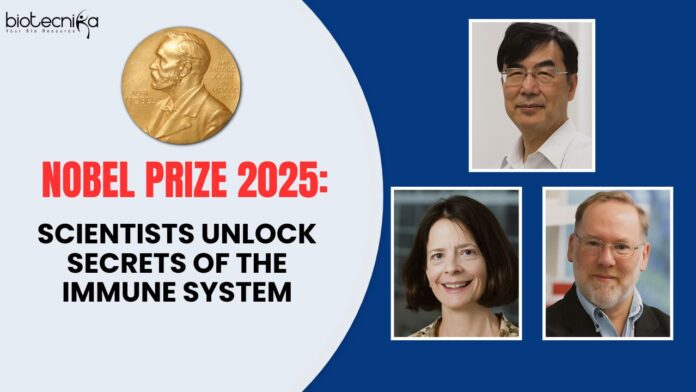Nobel Prize 2025: Scientists Unlock Secrets of the Immune System
The 2025 Nobel Prize in Physiology or Medicine has been awarded to Mary E. Brunkow, Fred Ramsdell, and Shimon Sakaguchi for their groundbreaking discoveries on how the immune system protects the body from attacking itself, opening new doors for treatments in cancer and autoimmune diseases. Their research explains how the immune system avoids attacking the body’s own tissues and organs, a process known as peripheral immune tolerance.
The winners were announced at the Karolinska Institutet in Stockholm on 6th October 2025. They will share a prize of 11 million Swedish kroner, around $1.17 million.
The scientists focused on T cells, a type of white blood cell that fights infections. They discovered a special group called regulatory T cells, which act as “peacekeepers” in the immune system. These cells prevent the immune system from attacking healthy cells in the body. They also identified the key gene, FOXP3, that controls these regulatory T cells.
“This is a prize I’ve been waiting to see,” said Dr. Alexander Marson, director of the Gladstone-UCSF Institute of Genomic Immunology. He said that discovering regulatory T cells was central to understanding autoimmune diseases and cancer.
Laurets and Their Discoveries
Dr. Sakaguchi, a professor at the University of Osaka, first studied the thymus, a small organ behind the breastbone, which trains T cells to avoid attacking the body.
Sakaguchi began studying the thymus in the 1970s and continued his research in the United States during the 1980s. In one experiment, researchers removed the thymus from mice three days after it was born. Normally, the thymus trains T cells in the first few days of life, because harmful cells should not enter the bloodstream. But unexpectedly, the mice’s immune systems attacked their own organs.
After more than a decade of research, Sakaguchi discovered why. The thymus does not stop every harmful cell from escaping. However, the immune system has a backup system: a special group of T cells called regulatory T cells. These cells act as “peacekeepers,” stopping rogue immune cells from attacking the body. Mice whose thymuses were removed too early could not develop these regulatory T cells, which explained the autoimmune attacks.
On the other side, Drs. Brunkow and Ramsdell studied mice with a severe autoimmune disease. They found that these mice lacked the FOXP3 gene, which is essential for forming regulatory T cells. Without FOXP3, the immune system attacks the body’s own cells. They later confirmed that humans with the rare IPEX autoimmune disease also have mutations in FOXP3.
Understanding FOXP3 and regulatory T cells has a huge impact on medicine. In cancer, tumors attract regulatory T cells to block the immune system. With this discovery, scientists can develop drugs to remove the brakes and allow the immune system to attack cancer. In autoimmune diseases, regulatory T cells are missing or defective, and new treatments may help restore balance. More than 200 clinical trials are currently exploring therapies based on this research.
How did the Nobel Prize winners feel about winning the prize?
Dr. Sakaguchi said he was “elated” and called the prize a “surprise and an honor.” He recalled that early in his career, obtaining funding for his work was difficult, but his persistence led to these discoveries.
Dr. Brunkow said she initially thought a call from Sweden was spam and did not expect to win the Nobel Prize.
The Nobel Prize in Medicine highlights how understanding the immune system’s balance can lead to better treatments for cancer, autoimmune disorders, and organ transplants.
Congratulations to the 2025 Nobel Prize Winners, Mary E. Brunkow, Fred Ramsdell, and Shimon Sakaguchi, for their remarkable achievement, which not only deepens our understanding of the immune system but also paves the way for life-saving treatments in the years to come.
























